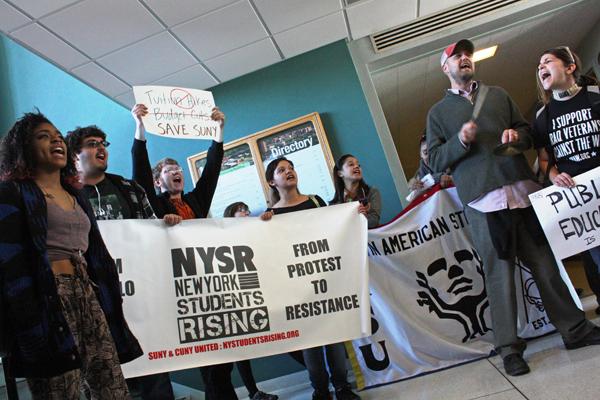
Students at Binghamton University joined others across the state Wednesday to rally against budget cuts and tuition hikes.
The BU protesters joined with a statewide student organization called New York Students Rising (NYSR), a group that coordinates rallies at SUNY and CUNY schools. A group of BU students called Concerned Binghamton Students partnered with NYSR over the summer to plan this rally.
Students were protesting NYSUNY 2020, a piece of legislation passed into law in New York during the summer authorizing the SUNY Board of Trustees to raise tuition for SUNY and CUNY campuses every year for the next five years.
There were about 30 to 50 people at the rally when it began outside the Glenn G. Bartle Library Tower at noon Wednesday.
As the group marched through the Lecture Hall, they opened classroom doors and encouraged students to walk out of class and join the rally while they chanted “the students united will never be defeated.”
Brian Zbriger, a graduate student in the sociology program and an adjunct professor, said the rally was important because many undergraduate students are not knowledgeable about issues surrounding SUNY’s budget.
“It’s very important for undergrads as well as graduate students to work together,” Zbriger said.
Students at the rally displayed posters, beat drums and chanted slogans about SUNY budget cutbacks. At about 12:30 p.m. the group began a march around campus that included stops at the Lecture Hall, Cooper Administration building and the Old University Union.
The demonstration ended with a teach-in and open discussion, which took place from 2:15 to 3 p.m. in Lecture Hall 7.
There were about 20 students in attendance at the teach-in. They discussed further plans for NYSR and methods the group could use to educate their peers about the state budget and its effect on BU students’ education.
Brendan McQuade, a graduate student in BU’s sociology program, was one of the NYSR members behind the rally.
McQuade called Wednesday’s protest “the inaugurating event in a year-long campaign” to repeal NYSUNY 2020 and reorganize SUNY’s budget.
The group discussed plans to advocate for student groups, work with professors to speak to students during class about the budget changes and participate in other demonstrations on campus.
Bill Martin, a sociology professor, also spoke at the teach-in and voiced his opposition to the way New York State budgets money for SUNY.
“SUNY Binghamton is being occupied by Wall Street when students really need to be occupying Wall Street,” Martin said, referring to the Occupy Wall Street protests taking place in Manhattan.
Those present at the teach-in also discussed attending an upcoming event, “Occupy Binghamton,” that is planned for Saturday, Oct. 15 in Downtown Binghamton. Democracy Matters is holding a campus event following the one Downtown.
More than 800 cities across the country will be taking part in similar “occupations” that day, protesting in solidarity with Occupy Wall Street. More information on the protests is available at www.occupytogether.org.
Andrew George, a senior majoring in electrical engineering, said he thinks the budget affects all students, whether they are currently attending college or have graduated already.
“If I’m going to be sending my children to school, I’m still going to have to deal with these problems,” George said.
Schuchanna Adlam, a senior majoring in sociology, first found out about the protest from a Facebook event created by McQuade. Adlam suggested that NYSR reach out to BU student groups to spread awareness about their movement.
“The message should be to get involved on campus and know what’s going on,” Adlam said. “You’re paying for your education, and the customer is always right.”
Morgan Hook, a spokesman for SUNY, issued a statement in response to the statewide protests, which took place at six SUNY campuses. One protest, which took place at the University at Albany, was nearly 200 strong and led to a meeting with the university president, the Albany Student Press reported.
“We certainly respect the views of all our students, and will continue to listen to their concerns as we develop policies for the State University of New York,” Hook said. “However, it is important to remember that the driving force behind rational tuition was SUNY’s elected student leadership.”
Hook’s statement discussed the benefits of the NYSUNY 2020 bill.
“Thanks to the advocacy of Gov. [Andrew] Cuomo and Chancellor [Nancy] Zimpher, our students know exactly how much their tuition will be for the next five years, and SUNY will be able to continue to provide them with the world-class education they deserve,” he stated.


